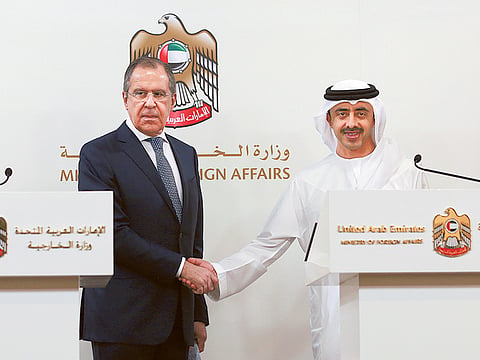Russia signals compromise on Syria rebels in Geneva talks
Moscow says it does not recognise Army of Islam and Ahrar Al Sham and says they can join negotiations on ‘individual basis’

Abu Dhabi, Moscow: Russia has agreed that representatives from two Syrian militant groups can participate in peace talks in Geneva, Foreign Minister Sergei Lavrov said, signalling a compromise from one of the main backers of President Bashar Al Assad.
The move doesn’t mean that Russia recognises the Army of Islam and Ahrar Al Sham, who should join the negotiations on an “individual basis,” Lavrov told a news conference in Abu Dhabi on Tuesday. The two are “terrorist groups,” he said through a translator. Russia in September started an air campaign that has targeted Daesh and rebel forces, strengthening Al Assad’s regime and enabling its military to make significant territorial advances.
Lavrov welcomed the start of UN-sponsored Syria peace talks in Geneva, saying efforts to resolve the conflict were entering a crucial time.
“Regarding Syria talks, this period is decisive,” he said at a press conference with UAE Foreign Minister Shaikh Abdullah Bin Zayed Al Nahyan.
Shaikh Abdullah said that it is imperative that countries, despite their conflicting stances, should work together to help resolve the Syrian and other crises in the region.
Asked about the situation in Syria, Shaikh Abdullah said that it is an issue of vital concern for all. “We should remember that we have reached this point for several reasons. There has been many opportunities to solve the problem earlier. Today, the situation is more complicated and the number of casualties have increased dramatically.”
He continued, “We have to be honest; we need to work as a collective and look at all the criteria, including political, economic, societal and developmental.”
He went on to say that he feels today that there are possible rays of hope following the general meetings that have been held on the issue, adding that, “It is the duty of all of us to get the Syrian people out of this tragedy.”
He stressed the importance of not blaming one party or another when looking for a solution, as that will not benefit the Syrian people. “We should work together and put our regional disagreements aside, because that will not be a fair approach in trying to end the Syrian crisis,” he said.
Lavrov said the talks needed to be “comprehensive” and to aim for “reaching common ground between the government and the opposition”.
“We welcome the start of the inter-Syrian talks in Geneva. They are just beginning and a search for the best ways to conduct these negotiations is under way,” Russian state news agency RIA Novosti quoted Lavrov as saying.
The United Nations-sponsored talks between the Syrian government and opposition started officially this week after being delayed over rebel demands. The Saudi-backed High Negotiations Committee, the main opposition group, wants an end to Russian air strikes in support of Al Assad, a halt to government assaults on civilian areas, the stopping of sieges of rebel-controlled towns and prisoner releases. A spokesman for the HNC said on Tuesday the grouping would quit the talks by the end of this week if its demands are not met.
The group’s chief negotiator is Army of Islam’s Mohammad Alloush, who arrived in Geneva on Monday. HNC chief spokesman Salem Al Muslet in an interview called Army of Islam “freedom fighters” and said that Ahrar Al Sham are “on our side” even though they aren’t part of the negotiating team.
The Syrian war, which has killed about 250,000 people and forced millions to flee their homes, has presented Europe with an escalated threat of terrorist attacks and a growing refugee problem. It has also fuelled the rise of Daesh, a militant organisation with a stronghold in Syria and Iraq that has spread to Yemen, Egypt, Libya and Afghanistan.
UN Special Envoy for Syria, Staffan de Mistura, began a meeting on Tuesday with the Syrian government delegation, led by the country’s ambassador to the world body, Bashar Jaafari. De Mistura plans to meet the opposition later in the day.
De Mistura said on Monday his main goals include keeping negotiators at the table and discussions focused on achieving a cease-fire.
Mediators are aiming for a nationwide truce, except for offensives targeting Daesh and the Al Qaida-linked Nusra Front, and creation by midyear of a transitional government that includes the opposition. A year after that, elections should follow under a new constitution.
De Mistura urged outside powers that have driven the latest peace initiative and are on opposite sides of the conflict — including Russia, Iran and the US as well as Turkey and Saudi Arabia — to lead efforts to end the violence.
“They all need to be engaged and accountable together with us in making sure that these are not just another Geneva talks,” he said, referring to two previous Syria peace conferences.
In a reminder of the deepening conflict, Syrian government forces attacked rebel fighters near the northern city of Aleppo, once the country’s commercial capital, threatening their supply lines from the Turkish border, the Syrian Observatory for Human Rights, an opposition monitoring group based in the UK said in a statement on Monday.
Sign up for the Daily Briefing
Get the latest news and updates straight to your inbox



